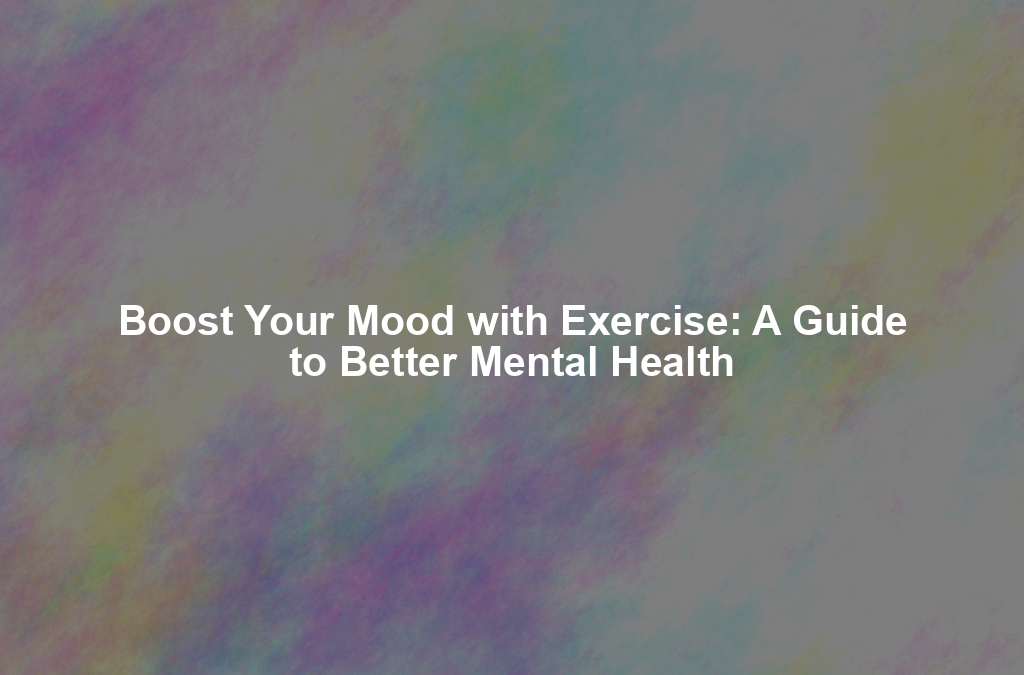
Boost Your Mood with Exercise: A Guide to Better Mental Health

Elevate Your Mood: How Physical Activity Enhances Mental Wellness. Exercise offers a powerful way to uplift your spirits. Engaging in physical activity significantly enhances mental wellness. Many people often underestimate the profound connection between exercise and mental health. Regular movement not only boosts energy but also releases feel-good chemicals that improve mood and reduce stress. Mental well-being is crucial in daily life, as a healthy mind leads to better relationships and increased productivity. Exercise provides a natural method to elevate your mood and enhance emotional health. Embrace the opportunity to transform your mental state through physical activity.
Understanding the Connection Between Exercise and Mood
The Science Behind Exercise and Mental Health
How exercise affects brain chemistry
Exercise transforms brain chemistry. Physical activity increases blood flow to the brain. This process delivers oxygen and nutrients. Brain cells grow and form new connections. Regular movement boosts the production of neurotrophic factors. These proteins support neuron health and function.
The role of endorphins and neurotransmitters
Endorphins play a crucial role in mood enhancement. Exercise triggers the release of these chemicals. Endorphins create feelings of happiness and reduce pain perception. Neurotransmitters like serotonin and dopamine also increase. These chemicals improve mood and promote relaxation.
Psychological Benefits of Regular Exercise
Stress reduction
Exercise serves as a powerful stress reliever. Physical activity lowers levels of stress hormones. Movement helps muscles relax and releases tension. Regular workouts provide a mental break from daily worries. A consistent routine leads to a calmer mind.
Improved self-esteem and confidence
Exercise boosts self-esteem and confidence. Achieving fitness goals fosters a sense of accomplishment. Physical improvements enhance body image. Regular activity encourages positive self-perception. Confidence grows with each step forward.
Types of Exercise for Mental Health

Aerobic Exercises
Running and cycling
Running and cycling offer incredible benefits for mental health. These activities increase heart rate and improve cardiovascular fitness. The rhythmic nature of running and cycling helps clear the mind. You can experience a sense of freedom and release. Regular participation leads to enhanced mood and reduced anxiety.
Swimming and dancing
Swimming provides a full-body workout that soothes the mind. The water’s buoyancy supports the body, reducing stress on joints. Swimming encourages relaxation and mental clarity. Dancing combines physical movement with music. This combination lifts spirits and boosts confidence. Both activities promote joy and self-expression.
Strength Training
Weightlifting
Weightlifting builds physical strength and mental resilience. Lifting weights requires focus and determination. Achieving new personal records boosts self-esteem. You gain a sense of empowerment and control. Consistent practice leads to improved mood and reduced stress.
Resistance exercises
Resistance exercises enhance muscle tone and mental well-being. Using bands or body weight increases strength and endurance. These exercises require concentration and discipline. Completing a challenging set brings satisfaction and confidence. Regular practice supports emotional balance and stability.
Mind-Body Exercises
Yoga
Yoga combines movement with mindfulness. Practicing yoga improves flexibility and reduces tension. Breathing techniques calm the mind and enhance focus. Yoga fosters a deep connection between body and mind. Regular sessions lead to increased peace and contentment.
Tai Chi
Tai Chi offers gentle movements that promote relaxation. This ancient practice enhances balance and coordination. Slow, deliberate motions reduce stress and anxiety. Tai Chi encourages mindfulness and inner harmony. Consistent practice nurtures tranquility and emotional strength.
Elevate Your Mood: How Physical Activity Enhances Mental Wellness
Elevate Your Mood: How Physical Activity Enhances Mental Wellness
The impact of regular exercise on anxiety and depression
Exercise offers a natural way to combat anxiety and depression. Physical activity releases endorphins that create feelings of happiness. Regular workouts reduce stress hormones like adrenaline. Consistent exercise helps manage anxiety levels. Many people find relief from depressive symptoms through movement. Physical activity provides a sense of accomplishment. Achieving fitness goals boosts self-worth. Exercise encourages positive thinking. A routine can transform mental health.
Enhancing cognitive function and sleep quality
Exercise improves cognitive function. Physical activity increases blood flow to the brain. This process enhances memory and concentration. Regular movement supports mental clarity. People who exercise often experience better focus. Exercise also promotes restful sleep. Physical activity regulates sleep patterns. A consistent routine helps you fall asleep faster. Quality sleep leads to improved mood and energy. Embrace exercise for a sharper mind and restful nights.
Creating an Exercise Routine for Mental Well-being
Setting Realistic Goals
Short-term vs. long-term goals
Setting goals provides direction and motivation. Short-term goals offer quick wins. These goals keep you motivated. Aiming to exercise three times a week is a good start. Long-term goals focus on bigger achievements. Running a marathon or lifting heavier weights are examples. Balance short-term and long-term goals for success.
Tracking progress
Tracking progress helps maintain motivation. Use a journal or app to record workouts. Note improvements in strength, endurance, or mood. Celebrate small victories along the way. Progress tracking reveals patterns and areas for improvement. Consistent tracking leads to greater achievements.
Finding Motivation and Consistency
Overcoming barriers
Barriers often hinder exercise routines. Identify common obstacles like time or energy. Create strategies to overcome these challenges. Schedule workouts like important appointments. Choose activities that fit your lifestyle. Flexibility in planning helps maintain consistency.
Building a support system
A support system boosts motivation. Friends or family can join workouts. Sharing goals with others creates accountability. Encouragement from loved ones inspires perseverance. Online communities offer additional support. Engaging with others fosters a sense of belonging. A strong support system enhances commitment to fitness.
Personal Stories and Testimonials

Real-life Experiences
Success stories
Many individuals have transformed their lives through exercise. A young woman named Sarah struggled with anxiety. She decided to start running every morning. The fresh air and rhythm of her feet on the pavement brought peace. Sarah noticed her mood improved significantly. Her confidence grew as she achieved personal milestones. Running became a source of joy and empowerment for Sarah.
A man named James battled depression for years. He felt trapped in a cycle of negative thoughts. James joined a local gym and began weightlifting. The physical challenge provided a sense of purpose. Each session at the gym lifted his spirits. James found strength he never knew existed. Exercise became a vital part of his recovery journey.
Challenges and overcoming them
Exercise journeys often come with challenges. Lisa faced obstacles when starting yoga. She felt self-conscious about her flexibility. Lisa persisted and attended classes regularly. Her dedication paid off as her skills improved. Yoga became a sanctuary for Lisa, offering mental clarity and relaxation.
Mark struggled with motivation to stay active. Busy work schedules left him exhausted. Mark decided to join a cycling group. The camaraderie and shared goals inspired him. Group rides became a highlight of his week. Mark discovered the power of community in overcoming barriers.
Expert Opinions
Insights from psychologists
Psychologists emphasize the mental health benefits of exercise. Dr. Emily Carter highlights the role of physical activity in reducing stress. Exercise provides a healthy outlet for emotions. Dr. Carter notes that regular movement enhances resilience. People who exercise often experience improved emotional regulation.
Dr. John Miller discusses the impact of exercise on self-esteem. Achieving fitness goals fosters a sense of accomplishment. Exercise encourages positive self-perception. Dr. Miller advises incorporating physical activity into daily routines. Consistency leads to long-term mental health benefits.
Advice from fitness trainers
Fitness trainers offer valuable guidance for mental well-being. Coach Alex recommends setting achievable goals. Small victories build confidence and motivation. Alex suggests finding activities you enjoy. Enjoyment increases the likelihood of sticking with an exercise routine.
Trainer Mia emphasizes the importance of variety. Mixing different types of exercise prevents boredom. Mia encourages trying new activities like dance or martial arts. Exploring diverse workouts keeps exercise exciting. A varied routine supports both physical and mental health.
Additional Resources and Support
Online Communities and Forums
Support groups
Online support groups offer a safe space for sharing experiences. These groups connect you with others facing similar challenges. Engaging in discussions provides encouragement. Support groups foster a sense of belonging. Many people find motivation through shared stories.
Fitness apps and tools
Fitness apps and tools help track progress. These resources offer workout plans and reminders. Apps provide insights into your fitness journey. Tools like pedometers or heart rate monitors enhance workouts. Technology supports consistency and goal achievement.
Professional Help
When to seek therapy
Therapy offers guidance when exercise alone isn’t enough. Professional help addresses deeper mental health issues. Therapists provide personalized strategies. Seeking therapy supports emotional well-being. Many individuals benefit from combining therapy with physical activity.
Combining exercise with other treatments
Combining exercise with other treatments enhances mental health. Medications or therapies work well alongside physical activity. A holistic approach improves overall well-being. Consult professionals for tailored advice. Integrating exercise into treatment plans boosts effectiveness.
Exercise offers numerous mental health benefits. Regular physical activity boosts mood and reduces stress. Exercise enhances self-esteem and promotes relaxation. Incorporate exercise into daily life for improved mental well-being. Start small with achievable goals. Consistency leads to lasting change. Begin your fitness journey today. Embrace the power of movement to transform your mind and body. Every step forward brings you closer to a healthier, happier you.


